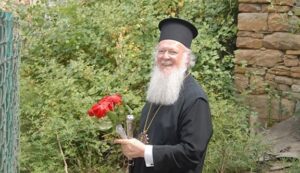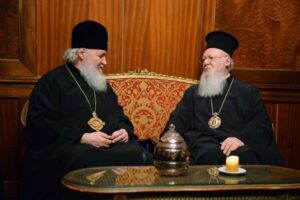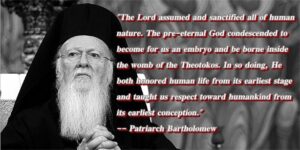1) The new conservative ecumenical coalition, 2) Secularized education, 3) The Environment, 4) Ukraine and Patriarch Kirill, 5) Abortion? Homosexuality?
Introduction
 I greatly admire His All-Holiness Bartholomew, the Ecumenical Patriarch of Constantinople. Please understand that I am a priest of the Antiochian Orthodox Archdiocese of North America, answerable directly to His Eminence Metropolitan Saba and ultimately to His Holiness Patriarch John X of Antioch.
I greatly admire His All-Holiness Bartholomew, the Ecumenical Patriarch of Constantinople. Please understand that I am a priest of the Antiochian Orthodox Archdiocese of North America, answerable directly to His Eminence Metropolitan Saba and ultimately to His Holiness Patriarch John X of Antioch.
However the Ecumenical Patriarch is “first among equals” in the Orthodox Church, and – all ecclesiastical issues aside, and there are some – we should give him attention. I have come to admire him especially because he shares many social implications of our Orthodox Faith with the Church and with the world, which many other Orthodox hierarchs seem to ignore. Of course, “saving souls and creating saints” is our first work. But, brothers and sisters, there is a whole lot more to Orthodox social teaching than just opposing abortion and homosexuality – which is the way I fear we sometimes appear to the world.
Furthermore, he has clearly done his homework and knows the facts and figures. And at age 83 he is still covering the landscape like a young man – traveling throughout the Orthodox world and beyond, speaking at conferences of many sorts in many countries. I who am 84 years old am amazed.
1) Ecumenical Patriarch denounces coalition of conservative Protestants and Orthodox
In a June 18, address to the Conference of European Churches, Ecumenical Patriarch Bartholomew of Constantinople strongly criticized a “’new ecumenism” that champions “traditionalistic values.
“Some American evangelical Christians, who had previously considered Catholic and Orthodox Christians as pagans worshipping idols, now appear willing to work with certain Catholic and Orthodox Christians in order to support these values,” he said. This ‘new ecumenism’ has even gone so far as to anoint President Vladimir Putin of the Russian Federation as its political champion, and Patriarch Kirill of the Orthodox Church of Russia as its spiritual leader.
“We see the consequences of this divisive and destructive mentality on full display in Russia’s current brutal attack against Ukraine as well as in its church’s justification for this war as the salvation of Ukraine from the alleged seduction of a godless, secular, and liberal West,” he continued. “Unfortunately, this ‘new ecumenism’ is essentially un-ecumenical, if not anti-ecumenical, insofar as it positions itself against other Christians who do not support its exclusive focus on such a set of values.
“Today, the rhetoric of the so-called ‘culture wars’ has grievously compromised any potential for dialogue, damaging the very core of ecumenism, as Orthodox are pitted against Orthodox, Catholics against Catholics, Protestants against Protestants—sometimes united only in their disagreement and denunciation,” he added. “The globalization and consecration of these ‘culture wars’ are arguably the new challenge of ecumenism, the new issue that divides us as Christians, the new barrier that prevents us from listening to and learning from one another.”
The Patriarch’s full speech may be accessed here: https://ec-patr.org/keynote-address-by-his-all-holiness-ecumenical-patriarch-bartholomew-at-the-16th-general-assembly-of-the-conference-of-european-churches-tallinn-june-18-2023/
2) Against Secularized Education
These are excerpts from a a talk he delivered on the feast of Three Hierarchs, the Greek celebration of learning.

“Unfortunately, education now seems to be indifferent to the spiritual nature of man, and young people are primarily focused on themselves and their needs rather than on the common good, on ‘success’ rather than on service. The Church is concerned with the dominant present-day ‘secularized individualistic educational system’ (Encyclical of the Holy and Great Synod, § 9), which transmits to young people, in the name of a supposedly purely humanitarian orientation of education, individualistic and hedonistic standards.
“Pedagogy should be oriented from the inexhaustible source of the wisdom of the Fathers, rather than viewing modern cultural data as a major regulatory principle. It goes without saying that the perspectives of man, his origin and destination, his well-being and freedom, his morals and culture, the ultimate outlook of his life, determine both the theory and direction of education respectively.
“The Fathers are augmented by an education that moves young people from the ‘self’ to the ‘common,’ from the ‘individual’ to the ‘person,’ from introversion to solidarity, from self-centeredness to giving. The man who is closed to his fellow human being represents according to the Fathers a particularly alienated form of human existence. On the basis of these principles, we would be able to help the new generation turn towards the essential and crucial aspects of life amid the full contradictions of modern reality. Only then will the idea of the ‘teacher’ and the ‘disciple,’ the wisdom of pedagogy and the spirit of apprenticeship, be saved. Only then will education remain a ‘healing of the soul,’ a ‘sacred mission.’
“The Christian’s attitude towards culture should not be defensive or rejective. This is the imperative of our faith, which calls us to the transformation of culture. And the necessary condition for this to happen is to know culture, to study it, to deal with it. Things do not change from a distance!
“This way of theology, with its double reference to the tradition of faith and to contemporary reality, has a timeless value and also applies to us today. And today theology is called upon to express the word of the hope within us against the signs of the times. Education is in an area that is now in constant crisis because of social change, the domination of technology and economics. We are convinced that, on the basis of the Fathers’ premises, an alternative proposal for pan-human education can be formulated.”
To access the full speech: https://www.archons.org/-/ecumenical-patriarch-education-seems-to-be-indifferent-to-the-spiritual-nature-of-man-and-to-focus-young-people-primarily-on-themselves-and-their-need
3) For protecting the Environment
The following is excerpted from His Holiness’ Encyclical of September 1, 2022, the Orthodox Ecclesiastical New Year, “The Day of protecting the natural environment”:
“For over three decades, the Holy Great Church of Christ emphatically and dynamically promotes the eco-friendly message of Orthodoxy through its diverse initiatives. September 1, 1989, will forever signify and symbolize the commencement of a movement that produced much fruit, raised awareness about the spiritual and ethical roots and parameters of the destruction of the natural environment, mobilized individuals and institutions, inspired the rest of the Christian world, highlighted the way of responding to this great challenge – a way that passes firstly through an understanding of its connection with the crisis of human freedom and the need for radical change in mentality and conduct with a view to creation, and secondly through a common and universal action given the global dimensions and tragic consequences of the ecological destruction.
 “‘Sustainable development'” is a one-way street. It will secure ecological balance in the present and constitute a guarantee for the future, but it has its conditions: ecological economy, changes in agricultural and biomechanical productivity, the production and use of energy, the movement and transportation of goods, new models of consumption, and so on. Unfortunately, good intentions, agreements and proclamations often remain theoretical, merely “big words,” without any impact on action, “superficial injunctions,” as it has been written. Humankind has not learned from the consequences of climate change, the destructive fires, heat waves, and floods, the rapid reduction in biodiversity, the pollution of the atmosphere and seas, the deforestation and social repercussions of the environmental crisis, above all revealed in the mass migration for ecological reasons. Humanity continues to be deluded about the innate capacity of nature to protect itself and overcome human-induced damages. We know, and yet we continue to act as if uninformed, suppressing the truth that with regard to its relationship to the natural environment, our modern technocratic and econo-centered civilization does not comprise progress, since the greatest devastation of the natural environment has taken place in our own time, and age where science and economy prevail. Climate change is an immense destruction caused by human irresponsibility and the impasse of our model of organization in the life of our economy. We only have a future if we understand that the protection of the integrity of creation does not only not comprise a hurdle for economic development, but is the vehicle for real progress.
“‘Sustainable development'” is a one-way street. It will secure ecological balance in the present and constitute a guarantee for the future, but it has its conditions: ecological economy, changes in agricultural and biomechanical productivity, the production and use of energy, the movement and transportation of goods, new models of consumption, and so on. Unfortunately, good intentions, agreements and proclamations often remain theoretical, merely “big words,” without any impact on action, “superficial injunctions,” as it has been written. Humankind has not learned from the consequences of climate change, the destructive fires, heat waves, and floods, the rapid reduction in biodiversity, the pollution of the atmosphere and seas, the deforestation and social repercussions of the environmental crisis, above all revealed in the mass migration for ecological reasons. Humanity continues to be deluded about the innate capacity of nature to protect itself and overcome human-induced damages. We know, and yet we continue to act as if uninformed, suppressing the truth that with regard to its relationship to the natural environment, our modern technocratic and econo-centered civilization does not comprise progress, since the greatest devastation of the natural environment has taken place in our own time, and age where science and economy prevail. Climate change is an immense destruction caused by human irresponsibility and the impasse of our model of organization in the life of our economy. We only have a future if we understand that the protection of the integrity of creation does not only not comprise a hurdle for economic development, but is the vehicle for real progress.
“This year, the celebration of the Day of the protection of creation is accompanied by the sound of weapons in Ukraine, by the cry of the victims of military violence, the bombardment of cities and infrastructures, the groaning of nature and moaning of refugees. Every war is a humanitarian and ecological catastrophe. The ongoing violence, beyond the thousands of human lives, also destroys the natural environment that it pollutes, forcing nations and peoples to return to ways of securing energy efficiency through means that are unfriendly to the environment. Thus, humanity enters a new vicious cycle of destructive impasses, which confirm the saying that homo sapiens to this day continues to behave simultaneously as homo demens, as imprudent and irrational.
4) Regarding Patriarch Kirill

From Reuters:
The spiritual head of the world’s Orthodox Christians said on Wednesday [speaking in the Parliament of Lithuania, March 22, 2023] that Russia’s powerful Orthodox Church shared responsibility for the conflict in Ukraine but that he stood ready to help in Russia’s postwar “spiritual regeneration”. Ecumenical Patriarch Bartholomew’s comments are a rebuke for Russian Patriarch Kirill, whose full-throated blessing for Moscow’s invasion of Ukraine has splintered the worldwide Orthodox Church. Bartholomew, who in 2019 infuriated Moscow by recognising the newly established Orthodox Church of Ukraine, said Russian authorities were using the Church as an “instrument for their strategic objectives”… “The church and the state leadership in Russia cooperated in the crime of aggression and shared the responsibility for the resulting crimes, like the shocking abduction of the Ukrainian children.”
These are the Patriarch’s words, reported in “The Orthodox Times”, October 22, 2022.
“It would not be possible for all the Churches not to condemn the violence, the war. But the Church of Russia let us down. I did not want the Church of Russia and Brother Patriarch Kirill to be this tragic exception. I don’t know how he can justify himself to his conscience. How he’ll justify it, how history will judge him. He had to stand up for himself. Because one can object to being pressured by President Putin. He should react to the invasion of Ukraine and condemn the war as all the other Orthodox Primates did.
“He did not; that is to his detriment and I am very sorry. We may have had other differences, the one known for the Autocephaly of the Church of Ukraine, the one we have had for centuries because the Russian Church covets the primacy of Constantinople, and undermines the foundations of the throne of Constantinople, but I expected brother Kirill at this critical, historic moment to rise to the occasion.
“If it is required to even sacrifice his throne, and tell Putin, Mr. President, I cannot agree with you, I resign, I leave. Or put him in jail, I don’t know what President Putin would do if the Patriarch reacted to his plans, but that is what we, the other Primates, would expect.”
5) Abortion and Homosexuality
Homosexuality
So far as I can find, his last comment on this subject was on September 9, 2013, at a Vespers in Tallin. Estonia: “… to… the Orthodox Church, the partnering of the same sex is unknown and condemned, and they condemn the contemporary invention of ‘mutual cohabitation’, which is the result of sin and not the law of joy, and by their actions the ‘females exchanged natural sexual relations for unnatural ones. In the same way the men also abandoned natural relations with women and were inflamed with lust for one another. Men committed shameful acts with other men, and received in themselves the due penalty for their error’ (Romans 1:26-28)”.
However, after the Archbishop of America recently baptized the adopted child of a gay couple in Greece, the Patriarch did not allow the subject to be discussed at the Synod of Constantinople.
Abortion
The Patriarch has emphasized what causes women to have abortions. For example, his statement when speaking in San Francisco in 1990: “Although the Orthodox Church believes the soul enters the body at conception and, generally speaking, respects human life and the continuation of the pregnancy,” Barthlomew said, the Church also “respects the liberty and freedom of all human persons and all Christian couples . . . . We are not allowed to enter the bedrooms of the Christian couples. He added. “We cannot generalize. There are many reasons for a couple to go toward abortion.” (San Francisco Chronicle-7/20/90p.A22)
However:

Or from his book, Conversations with the Ecumenical Patriarch Bartholomew I: “As for abortion, this is always profoundly dramatic for a woman and deeply injures her femininity. For this reason, abortion for the sake of convenience is (we cannot deny it) extremely serious and must be strongly discouraged. But there are situations of extreme distress when abortion can be a lesser evil, as, for example, when the life of the future mother is in danger.”
However, he says he has read and gives his Patriarchal endorsement to the Greek Orthodox Church’s recent significant commentary on social issues For the Life of the World, which includes the following: “A human being is more than the gradually emergent result of a physical process; life begins at the moment of conception. A child’s claim upon our moral regard then is absolute from that first moment, and Christians are forbidden from shedding innocent blood at every stage of human development. The Church recognizes, of course, that pregnancies are often terminated as a result of poverty, despair, coercion, or abuse, and it seeks to provide a way of reconciliation for those who have succumbed to these terrible pressures.”
It is obvious that the Patriarch has given less attention to these two issues. Why? I don’t know. Some say it is because he personally is pro-abortion and pro-gay. However on those grounds the same charge could be leveled against Our Lord Jesus Christ who, so far as we know, said nothing at all about either of them.
________________________________________________
Next Week: I’m not sure, but I think I’ll write on What I’ve learned from being an interim pastor in my old age.
Week after next: The Transfiguration
